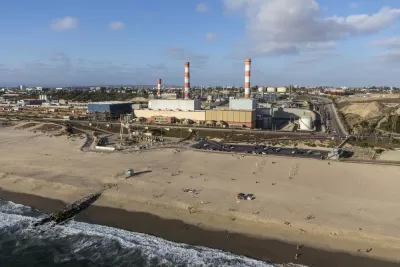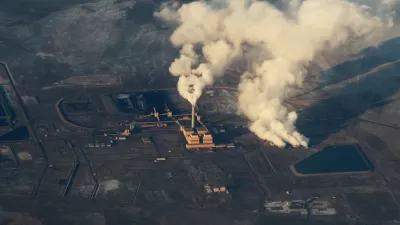The bell tolls for the Scattergood, Harbor, and Haynes power plants, after Los Angeles Mayor Eric Garcetti promises a transition to renewable energy. The city was going to spend $5 billion to transition to natural gas.

{Updated February 20, 2019] "The Los Angeles Department of Water and Power will be shuttering its three gas-fired coastal power plants over the next decade, a key step in the city’s aspiration to become the nation’s first metropolis to run entirely on renewable energy," reports Martin Wiskol.
The power plants, located in Long Beach, Wilmington and Playa del Rey, "had been slated for new, more efficient units run on natural gas. That would have extended the life of the plants until 2045, the state’s target for eliminating fossil-fuels as a source for electricity," according to Wiskol.
The announcement effectively shifts $5 billion in expected costs to build the new natural gas units to accelerating the transition to renewable energy.
While the announcement "thrilled" environmentalists and public health advocates, according to another article by Sammy Roth, the hard work of replacing the three facilities without raising energy prices or increasing the risk of power outages is just beginning.
As Roth notes, the city has mandate from the state of California to stop burning gas at the three plants. "DWP officials had said they weren’t sure clean technologies like batteries would be cheap or effective enough to replace the gas plants before the state’s deadlines, 2024 for Scattergood and 2029 for Harbor and Haynes," according to Roth.
FULL STORY: Los Angeles to close 3 power plants in aggressive move toward green energy

Maui's Vacation Rental Debate Turns Ugly
Verbal attacks, misinformation campaigns and fistfights plague a high-stakes debate to convert thousands of vacation rentals into long-term housing.

Planetizen Federal Action Tracker
A weekly monitor of how Trump’s orders and actions are impacting planners and planning in America.

San Francisco Suspends Traffic Calming Amidst Record Deaths
Citing “a challenging fiscal landscape,” the city will cease the program on the heels of 42 traffic deaths, including 24 pedestrians.

Defunct Pittsburgh Power Plant to Become Residential Tower
A decommissioned steam heat plant will be redeveloped into almost 100 affordable housing units.

Trump Prompts Restructuring of Transportation Research Board in “Unprecedented Overreach”
The TRB has eliminated more than half of its committees including those focused on climate, equity, and cities.

Amtrak Rolls Out New Orleans to Alabama “Mardi Gras” Train
The new service will operate morning and evening departures between Mobile and New Orleans.
Urban Design for Planners 1: Software Tools
This six-course series explores essential urban design concepts using open source software and equips planners with the tools they need to participate fully in the urban design process.
Planning for Universal Design
Learn the tools for implementing Universal Design in planning regulations.
Heyer Gruel & Associates PA
JM Goldson LLC
Custer County Colorado
City of Camden Redevelopment Agency
City of Astoria
Transportation Research & Education Center (TREC) at Portland State University
Jefferson Parish Government
Camden Redevelopment Agency
City of Claremont



























